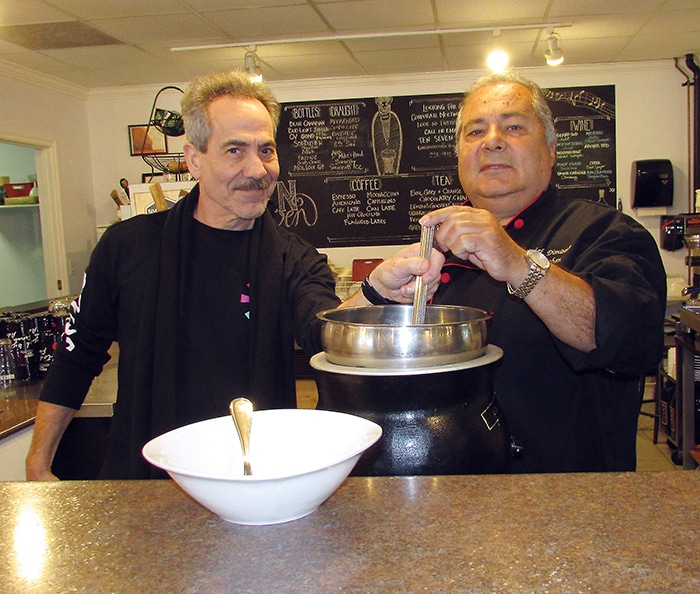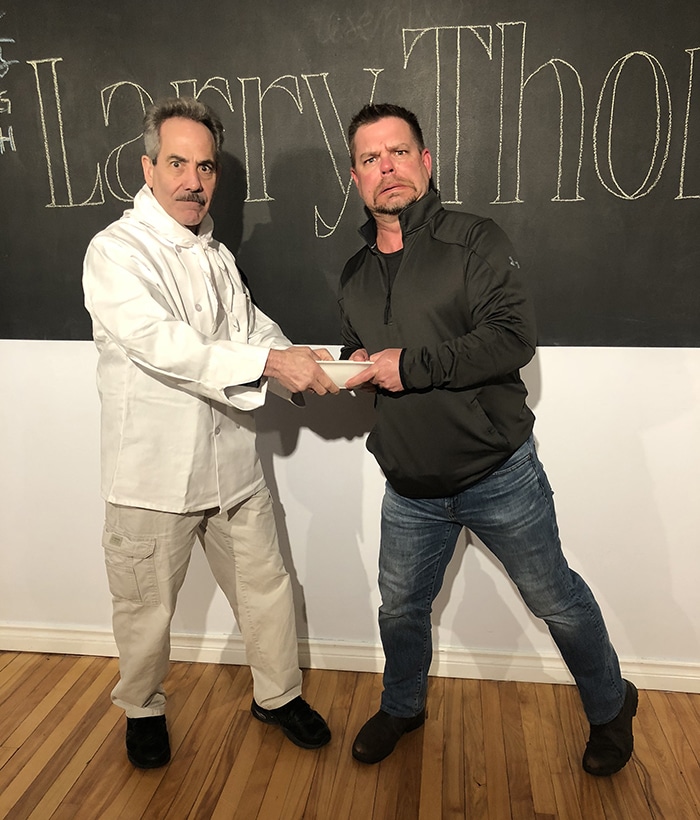
“No soup for you!”
Four words that draw the average person’s mind to the character of the Soup Nazi on the sitcom Seinfeld.
For the man who played the Soup Nazi – Larry Thomas – those words still draw a smile.
It doesn’t matter how many times over the years people have asked him to say those four words – heck, his own mother does – he doesn’t mind.
Thomas will make appearances at events and in cameos in character. Where some entertainers seek to distance themselves from a potential typecasting character, or a song that made them famous, Thomas embraces it.
He recently did two nights at the Ten-Seven Cafe in Chatham discussing his acting career that includes appearances on Seinfeld, Scrubs, Arrested Development and in Austin Powers.
At the centre of it all was the Soup Nazi, an abrasive, strict seller of very tasty soup that was in great demand, but not necessarily always available to the four key characters of Seinfeld – Jerry, George, Elaine and Kramer.
Thomas said in his mind, the character was put on the planet to make their lives miserable.
“I knew they’d have a terrible relationship with him,” he said.
George asked for bread with his soup? “No soup for you!”
Elaine bored Thomas’ character with meandering conversation? “No soup for you!”
It was behave as the Soup Nazi wanted or…”No soup for you!”
Landing the role was by chance. Thomas said he asked fellow actor Jeffrey Tambor to introduce him to the casting director at the time for the Larry Sanders Show, Marc Hirshfeld, who also happened to handle the casting duties for Seinfeld. The two hit it off, and Thomas earned the chance to audition for the Soup Nazi.
Winning the role was in some ways difficult, but easy in others.
“They had a couple of very obvious heavy hitters in mind and they probably didn’t think they needed to look too far. But they wanted to bring me in just to see what I could do,” Thomas said. “I ended up touching on something the other two guys missed.”
That “something” was the rough, angry, abrasiveness that Seinfeld viewers readily identify with in the Soup Nazi.
“I knew what the food service industry was like. I totally got a feel for this guy. It was really simple. I knew Seinfeld from the first seven seasons; very familiar with the characters. I just thought a guy with a nickname like that must be really, really strict. And definitely the only purpose of him being in that show would be to run afoul of them (the four main characters),” Thomas said.
“Even though there was no script for me to look at the night before, my mind was just filling with images of what kind of trouble would I get into with them?”
He tried to emulate Omar Sharif’s delivery and accent from Lawrence of Arabia and continued to conjure up his Soup Nazi.
“And then the nickname struck me as someone who was just volatile,” he explained. “Jerry was a little surprised by how angry my interpretation came off. He did ask me to do it again, not so angry. But in the end he came up to me and said, ‘You know what? Do it the way you did it. The angrier, the funnier.’ And somehow it came out that way.”
Thomas said he really enjoyed his time on Seinfeld.
“Seinfeld was all about the characters. It ends up boiling down to the way these four people treated humanity – each other and others. If you take away all the story lines and even Michael Richards’ fantastic historic physical comedy, it still comes down to the fact they were constantly doing things that people get their comeuppance from. And they always did.”
In terms of comeuppance, Thomas said the Soup Nazi’s antics resonated with people in the food and beverage industry, and in retail.
“The world of restaurateurs loves him. They have to deal with the public. It’s in every retail situation, but just more so when it comes to food and people’s exactingness,” he said. “I’m sure there isn’t a restaurateur alive that wouldn’t love to say to somebody, ‘This is the way I made it! This is the way I serve it! If you don’t want it, get out!’
As well known as the Soup Nazi character is for anyone who has watched Seinfeld, and given the widespread success of the iconic sitcom, most everyone in North America knows of the abrasive character Thomas played. Still, he does encounter people who are unaware of the character and who he is.
“There was one funny incident on an airplane with a flight attendant who actually took my order for food. We were in first class on this particular trip. I said no to the soup, so she actually said, ‘So, no soup for you,'” Thomas said. “And the guy sitting next to me turned out to be the guy who wrote the music for ‘Dream Girls;’ he was just laughing. We both thought she was just doing a really dry reading.
“After he quizzed her a little later on, it turned out she’d never heard of the Soup Nazi and just chose those four words.”
As mentioned, Thomas also appeared on sitcoms such as Scrubs and Arrested Development, and looks back on those appearances with a smile.
“I would have liked to have done a lot more work than I did and have done, but I must say, just getting to be on Seinfeld, Scrubs and Arrested Development is such a thrill to me. I could hand pick those three shows – other than Everybody Loves Raymond – as my favourite comedies of their generations,” he said.
And as for Everybody Loves Raymond, the long-running Ray Romano sitcom, Thomas said he actually auditioned for the role of Robert, Raymond’s brother, who was ultimately played by Brad Garrett.
“I did read for Robert on Everybody Loves Raymond, but I was so totally wrong for the part. They wanted a very big schlub. I couldn’t act that,” he said. “Brad Garrett was a genius. I once communicated to him that it was the happiest part I never got because I got to watch him do it.”
As to how the Soup Nazi landed at the Ten-Seven Cafe sharing laughs with patrons, owner Brent DeNure and Chef Dimitar, Thomas said he first met DeNure about 15 years ago in Los Angeles.
“We met in 2005 at an office at Universal Studios. We talked and built up a friendship,” he said.
DeNure wanted to get Thomas up here for years, and finally things worked out and Thomas and his wife Angela made the trip.
“We were back and forth on it for years,” DeNure said. “But when Chef Dimitar came on board, that was the catalyst.”
DeNure said the evenings were designed to be informal and conversational, “a whole backstage type of experience.”







